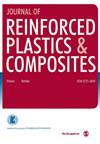用于假体插座的单纤维和混合纤维复合材料层压板的比较
IF 2.2
3区 材料科学
Q3 MATERIALS SCIENCE, COMPOSITES
引用次数: 0
摘要
传统的义齿套筒通常由热塑材料和木质材料组成。然而,众所周知,这些假肢套筒不舒适、笨重,而且在经济上具有挑战性。天然纤维因其可生物降解、持久耐用、生物相容性好等特性,正在迅速适应环境并变得越来越受欢迎。在结构部件的设计和开发中,天然纤维正在取代合成纤维。这项研究考察了一种新型混合复合材料,它由天然纤维和合成纤维(玄武岩、黄麻和碳)制成,并在聚酯热固性基体中得到增强。然后将这种混合复合材料的性能与使用黄麻、玄武岩和碳纤维制造的原始或单一纤维增强复合材料的性能进行了比较。样品采用真空辅助树脂传递成型技术制造,并在室温下固化。然后对样品进行弯曲和冲击试验。混合复合材料的冲击强度为 46.71 kJ/m2,高于所有其他单一纤维组合。经测定,混合复合材料的抗弯强度为 66.25 兆帕,与玄武岩纤维的抗弯强度相当,并超过了其他传统单纤维复合材料层压板的抗弯强度。断面分析表明,弯曲失效的主要原因是分层和纤维微弯曲。虽然混合增强复合材料在冲击强度和弯曲强度方面都具有更优越的性能,但玄武岩纤维表现出了与之相当的强度,尤其是弯曲强度。总之,混合复合材料在假肢结构中的应用前景非常广阔。本文章由计算机程序翻译,如有差异,请以英文原文为准。
Comparison of single- and hybrid-fiber composite laminates for use in prosthetic sockets
Traditional prosthetic sockets often consist of thermoplastic and wood-based materials. However, these sockets are known to be uncomfortable, heavy, and economically challenging. Natural fibers are quickly adapting and becoming more popular because of their biodegradable, long-lasting, and biocompatible nature. They are replacing synthetic fibers in the design and development of structural parts. This research looked into a new hybrid composite made of natural and synthetic fibers (basalt, jute, and carbon) that are reinforced in a polyester thermoset based matrix. The performance of this hybrid composite was then compared to that of pristine or single fiber-reinforced composites manufactured using woven jute, basalt, and carbon. The samples were manufactured using the vacuum-assisted resin transfer molding technique and cured at room temperature. The samples were then subjected to flexure and impact tests. The hybrid composite had an impact strength of 46.71 kJ/m2 , higher than all other single fiber combinations. The flexural strength of the hybrid composite was determined to be 66.25 MPa, matching that of basalt fiber and surpassing that of other conventional single fiber composite laminates. Fractographic analysis has revealed that the main cause of failure in flexure is mostly attributed to delamination and fiber micro-buckling. Although hybrid reinforced composites had superior performance in terms of both impact and flexure strength, basalt fibers demonstrated comparable strength, specifically in flexure. Overall, the hybrid composite possesses exceptional promise for use in prosthetic construction.
求助全文
通过发布文献求助,成功后即可免费获取论文全文。
去求助
来源期刊

Journal of Reinforced Plastics and Composites
工程技术-材料科学:复合
CiteScore
5.40
自引率
6.50%
发文量
82
审稿时长
1.3 months
期刊介绍:
The Journal of Reinforced Plastics and Composites is a fully peer-reviewed international journal that publishes original research and review articles on a broad range of today''s reinforced plastics and composites including areas in:
Constituent materials: matrix materials, reinforcements and coatings.
Properties and performance: The results of testing, predictive models, and in-service evaluation of a wide range of materials are published, providing the reader with extensive properties data for reference.
Analysis and design: Frequency reports on these subjects inform the reader of analytical techniques, design processes and the many design options available in materials composition.
Processing and fabrication: There is increased interest among materials engineers in cost-effective processing.
Applications: Reports on new materials R&D are often related to the service requirements of specific application areas, such as automotive, marine, construction and aviation.
Reports on special topics are regularly included such as recycling, environmental effects, novel materials, computer-aided design, predictive modelling, and "smart" composite materials.
"The articles in the Journal of Reinforced Plastics and Products are must reading for engineers in industry and for researchers working on leading edge problems" Professor Emeritus Stephen W Tsai National Sun Yat-sen University, Taiwan
This journal is a member of the Committee on Publication Ethics (COPE).
 求助内容:
求助内容: 应助结果提醒方式:
应助结果提醒方式:


